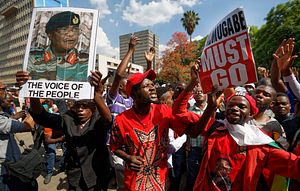President Robert Mugabe’s resignation on November 21, 2017 came after a military coup that ended his 37 years of unbroken control over Zimbabwe. Yet the weakness within the Mugabe regime was apparent in the last few years, as two factions within Zimbabwe’s ruling party, the Zimbabwe African National Union, Patriotic Front (ZANU-PF), had been jockeying for the right to succeed the 93-year-old Mugabe. One group, called “Generation 40” or G40, is headed by First Lady Grace Mugabe and backed by younger political leaders Jonathan Nathaniel Moyo and Saviour Kasukuwere. Their competitors, the Lacoste Group, primarily consists of senior independence era leaders; the group is named after former Vice President Emmerson Mnangagwa, who is known by his nom de guerre “crocodile,” acquired during the Rhodesian Bush War against the white minority government. The Lacoste group has been historically close to the Zimbabwean Defense Forces, currently headed by General Constantino Chingewa. While Grace Mugabe’s expensive lifestyle and desire to become her husband’s successor is well known, Mnangagwa is known for his brutality in crushing the Ndebele opposition in the 1980s Gukurahundi and his unswerving loyalty to Mugabe.
The events that started on November 14, when General Chinegwa led a coup to wrest power from President Mugabe, arrest members of the G40, and assure the return of ousted Vice President Mnangagwa (possibly to become president) has been extensively covered by the international press. However, little is known about the international aspects of the coup, specifically the role of China. Despite issuing official denials of such reports, it seems that China supported the coup, at least tacitly. It appears that China was initially closer to the G40 faction, but shifted support to the Lacoste faction because of its ties to the Zimbabwean army and Mnangagwa himself.
Although China has officially denied involvement in the recent coup, it has cultivated deep ties with Zimbabwe’s political leadership since the 1960s-70s Rhodesian Bush War. Mugabe’s ZANU, primarily led and soldiered by the Shona ethnic group, acquired weapons and funding from China. From the 1990s, China continued to increase economic ties with Zimbabwe; it has investments in mining, agriculture, energy, and construction. In 2015, China became Zimbabwe’s top export market and accounted for by far the largest share of foreign direct investment into Zimbabwe (74 percent). The same year, China also promised a $4 billion aid and investment package in 2016, and has pledged $46 million for the building of Zimbabwe’s new parliament building.
China’s ties with the Zimbabwean Army, from which the Lacoste faction draws its strength, are particularly deep. It has sold weapons ranging from small arms to fighter jets and, in an almost symbolic culmination of these ties, China financed the building of Zimbabwe’s new National Defense College, which trains both defense and internal security forces. A parallel aspect of these arms sales, however, has been the alleged diverting of revenues from Zimbabwe’s Marange diamond fields, in which the primary investor is China’s Anjin Investments.
The diamond mines were, in fact, the source of China’s increasing concerns about the Mugabe regime’s indigenization policy, which required 51 percent local ownership of foreign businesses. Although the two Chinese companies, Anjin and Jinan, began operations in 2012 with 51 percent of shares owned by Zimbabweans, the Zimbabwean government integrated them into the state owned Zimbabwe Consolidated Diamond Company (ZCDC) in 2015, which led to vehement public opposition by the Chinese government. The crisis also led to the overall deterioration of China-Zimbabwe relations, and China refused to support Mugabe in his 2016 crackdown on the opposition.
However, the threat to Chinese investments in the diamond mines also hurt the Zimbabwean military, which has reportedly collaborated with these companies under the leadership of General Chiwenga. A 30 percent stake of the aforementioned Anjin Investments, for example, is allegedly controlled by the Zimbabwean Defense Forces through a subsidiary. The Zimbabwean security forces’ broad involvement in the diamond business has especially enriched senior officers associated with the Mugabe regime. Also, during Zimbabwe’s 1998-2002 intervention in Congo’s civil war, Mnangagwa was accused by the UN of using the Zimbabwean Defense Forces to profit from illegally mined diamonds.
After being ousted from his vice presidency by Mugabe in November 2017, Mnangagwa reportedly fled to China. He had cultivated relations with senior members of the Chinese Communist Party, which allegedly go back to the Rhodesian Bush War when China offered the guerrillas both training and weapons. General Chiwenga also visited China from November 8 to 10, on an official trip organized prior to the recent events. During the visit, he met with Li Zuocheng of China’s Central Military Commission, the organization within the Communist Party that controls defense and security policymaking, as well as China’s Defense Minister General Chang Wanquan. Despite China’s denial of any involvement in the recent coup, and announcement of a “wait and watch” approach, Mnangagwa’s presidency with Chiwenga’s backing from the Armed Forces will assure it a firm grip on Zimbabwean politics and economy, assuring China’s interest in regional stability in met.
Vasabjit Banerjee is an assistant professor of political science at Mississippi State University. His primary research interests are contentious politics and the local political-economies of state-formation in developing societies; specifically South Asia, Latin America, and Southern Africa.
Timothy S. Rich is an assistant professor of political science at Western Kentucky University. His research focuses on public opinion and electoral politics in East Asian democracies.































